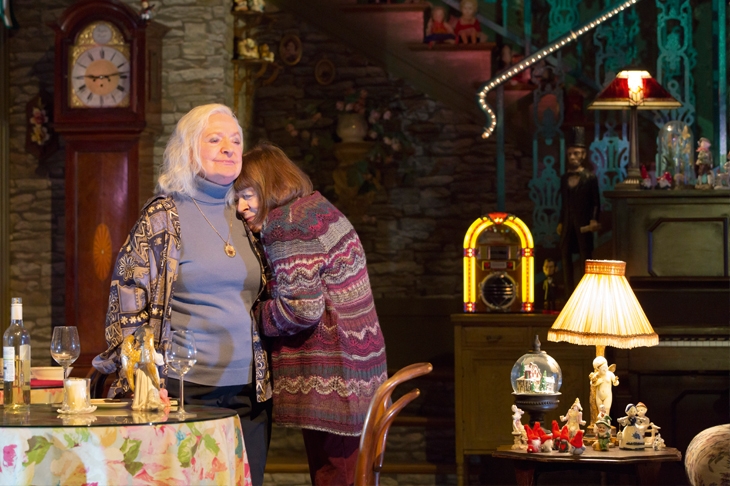The NT’s new production, John, is by a youngish American playwright, Annie Baker. We Brits tend to assume that ‘john’ is American for ‘toilet’ so perhaps lavatorial treats are in store. The setting is a provincial hotel run by a blithering old dear whose only guests are two grumbling yuppies with marriage problems. The plot of a play usually starts within ten minutes but not here: nothing happens. That’s the point. Instead of a story there’s a minor predicament and this, oddly enough, suits the show’s personalities.
The yuppies, Elias and Jenny, are just about memorable enough to be human beings but they haven’t the substance or grit for dramatic characters. Their personalities lack density or appetite. They have no sharp edges, no grand flaws, no higher aims. Elias is a vague splodge of self-pity concerned with insults directed at his Jewish heritage. He works as a computer something-or-other. His hobby is playing the drums. Jenny is a simpering hypochondriac whose diseases ruin the couple’s holiday plans and leave them stranded in the breakfast room with the blithering old dear. Her best friend is another blithering old dear whose husband is dead. And she’s blind. This doesn’t enliven matters.
In between yawns, I turned to the programme notes and discovered that Annie Baker won the Pulitzer Prize in 2014. The play has all the hallmarks of talent corrupted by acclaim. The artsy stage directions are contrived and very pleased with themselves. To indicate the passing of time, the old dear ambles over to the grandfather clock and turns the long hand through many revolutions. To indicate the close of an act, she pulls the stage curtains together. Her little hotel is cluttered with trinkets, toys and multicoloured junk which we, the smart urban play-goers, are expected to find amusing. We wouldn’t laugh at bumpkins to their faces, of course, but we can do it vicariously, in the theatre, using art to conceal our giggles. This seems more demeaning to the audience than to the characters. There are many scenes inthis overlong play that consist, literally,of drivel.
During the second or third hour of the show, Jenny remembers that she has a job. She sells twaddle to TV quizzes. The blithering old dear asks for a display of her talent and Jenny poses a multiple-choice question. The eyes of an ostrich and the brain of an ostrich stand in what ratio, by volume? Half, equal, double or treble? (Answer: treble.) More drivel seeps forth as the blithering old dear recites a list of bird species and their collective nouns. She ends with, ‘an exaltation of larks, that’s my favourite’. Well, it’s everyone’s favourite but this commonplace is hardly worth writing down, let alone including in a play. Towards the end, a sliver of action. Elias threatens to vandalise a doll belonging to the blithering old dear and similar to a toy owned by Jenny in her childhood. But the doll isn’t Jenny’s so the threat is directed at the blithering old dear, who is absent from the scene, and not at Jenny. A curious error, easily corrected: the doll should be Jenny’s property, perhaps an heirloom that she travels with everywhere. Why did no one point this out to the Pulitzer victim? Perhaps they didn’t dare.
Director James Macdonald accentuates the effect of this 200-minute thumb-twiddler by elongating every pause for several beats longer than necessary. Played faster, it could be completed in 100 minutes. But the result would be the same because zero halved is still zero.
The Believers Are But Brothers is a groundbreaking work in which play-goers interact with WhatsApp during the show. The helpful staff couldn’t download the app to my antique Nokia (which predates Princess Charlotte) so I missed the interactive element. But I had plenty to keep me occupied.
The writer/performer, Javaad Alipoor, is a British Shia Muslim who wants to explain radicalisation by telling stories of angry young votaries. Atif is a Muslim loner who watches a Syrian air strike on the web and is contacted by a recruiter named ‘the stranger’. We hear of Marwan, another disgruntled Brit, who gets radicalised by a mystery temptress, ‘the Damascene woman’. We flip to 1983 where we hear of ‘a large tattooed convicted pimp with a heavy drink problem’ who meets his religious mentor in a Jordanian prison. The pimp later becomes the terrorist Abu Musab al-Zarqawi. We hear of the numerous atrocities he committed in Iraq in 2003. Then we meet a disgruntled Californian, Ethan, who adores beheading videos. And so on. Complexity cross-fertilises with complexity. The trouble is that a multidimensional topic such as radicalisation requires clear, simple treatment. This show binds it up in knots. Thank God I was disconnected from WhatsApp or I might have got completely lost.







Comments